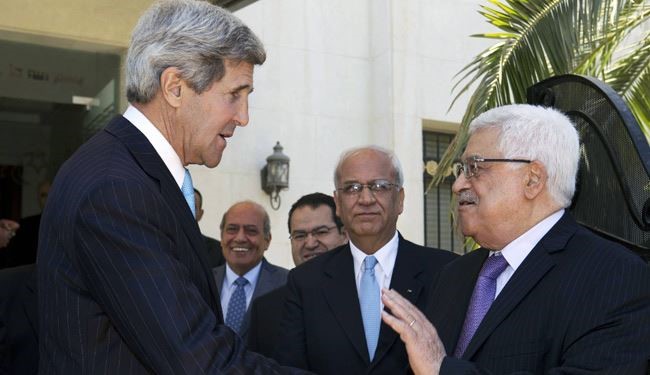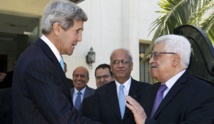Expected to arrive early Sunday in the Egyptian capital, Kerry will head almost straightaway to the day-long conference aimed at helping the Gaza Strip pummeled by the 50-day war between Israel and Hamas militants earlier this year.
But US officials acknowledged a creeping donor fatigue, amid the recognition that the world has been here before in the decades of Israeli-Palestinian conflict.
"I think it's very fair to say that there are serious questions being raised by a lot of the donors about... how best to break this cycle" of violence, a senior State Department official told reporters.
There has to be reflection about "how best to ensure that we're not going to find ourselves back here doing the same thing again in a year or two."
- Bid to chart a new course -
Kerry will tell the conference that the United States remains committed to the two-state solution and is ready to revive negotiations for a comprehensive peace deal, after his own dogged nine-month bid to seal an accord that collapsed earlier this year.
He would stress the need "to chart a different course for the future of Gaza, which includes trying to change the fundamental dynamic there," the State Department official said, asking not to be identified.
But prospects for new peace talks seem dim, with Israel and the Palestinians yet to agree a permanent ceasefire after the bloody fighting, which ended in August after the deaths of some 2,200 Palestinians and 73 Israelis.
The Palestinian Authority has unveiled a 76-page reconstruction plan for Gaza, calling for $4 billion to rebuild the war-battered territory, with the largest amount going to build housing for some 100,000 left homeless.
But the US official admitted: "I don’t know whether anybody thinks we’re going to get to four billion."
While the US has already committed some $118 million, so far it has not made any pledges of new funds beyond that. Europe and Gulf nations, however, are expected to make significant pledges of support.
- Ukraine, Iran on agenda -
From Cairo, Kerry will head to Paris where he is due to meet Tuesday with Russian Foreign Minister Sergei Lavrov seeking to resolve yet another conflict -- the fighting in eastern Ukraine.
Western countries are trying to shore up a September 5 ceasefire deal in Ukraine which has been routinely breached in the country's east by pro-Russian separatist groups.
The complex civil war in Syria, as well as US efforts to raise a coalition to fight the Islamic State group, will also dominate the two veteran diplomats' talks in the French capital.
Kerry will then travel to Vienna to meet officials from another US adversary, Iran, as he seeks to hammer out a deal on reining in its nuclear program by a November 24 deadline.
Iran's deputy foreign minister Abbas Araqchi, quoted by the Fars and ISNA news agencies on Friday, said there was already an acceptance that the deadline could be missed.
"If we cannot get a good enough result from this round of talks, it is obvious that we will not reach an agreement by November 24," he said.
Washington has insisted there is still time to nail down what is a complex and highly technical agreement, and has so far resisted any talk of extending the discussions for a second time.
--------------------------------------------------------------------------------------------------
But US officials acknowledged a creeping donor fatigue, amid the recognition that the world has been here before in the decades of Israeli-Palestinian conflict.
"I think it's very fair to say that there are serious questions being raised by a lot of the donors about... how best to break this cycle" of violence, a senior State Department official told reporters.
There has to be reflection about "how best to ensure that we're not going to find ourselves back here doing the same thing again in a year or two."
- Bid to chart a new course -
Kerry will tell the conference that the United States remains committed to the two-state solution and is ready to revive negotiations for a comprehensive peace deal, after his own dogged nine-month bid to seal an accord that collapsed earlier this year.
He would stress the need "to chart a different course for the future of Gaza, which includes trying to change the fundamental dynamic there," the State Department official said, asking not to be identified.
But prospects for new peace talks seem dim, with Israel and the Palestinians yet to agree a permanent ceasefire after the bloody fighting, which ended in August after the deaths of some 2,200 Palestinians and 73 Israelis.
The Palestinian Authority has unveiled a 76-page reconstruction plan for Gaza, calling for $4 billion to rebuild the war-battered territory, with the largest amount going to build housing for some 100,000 left homeless.
But the US official admitted: "I don’t know whether anybody thinks we’re going to get to four billion."
While the US has already committed some $118 million, so far it has not made any pledges of new funds beyond that. Europe and Gulf nations, however, are expected to make significant pledges of support.
- Ukraine, Iran on agenda -
From Cairo, Kerry will head to Paris where he is due to meet Tuesday with Russian Foreign Minister Sergei Lavrov seeking to resolve yet another conflict -- the fighting in eastern Ukraine.
Western countries are trying to shore up a September 5 ceasefire deal in Ukraine which has been routinely breached in the country's east by pro-Russian separatist groups.
The complex civil war in Syria, as well as US efforts to raise a coalition to fight the Islamic State group, will also dominate the two veteran diplomats' talks in the French capital.
Kerry will then travel to Vienna to meet officials from another US adversary, Iran, as he seeks to hammer out a deal on reining in its nuclear program by a November 24 deadline.
Iran's deputy foreign minister Abbas Araqchi, quoted by the Fars and ISNA news agencies on Friday, said there was already an acceptance that the deadline could be missed.
"If we cannot get a good enough result from this round of talks, it is obvious that we will not reach an agreement by November 24," he said.
Washington has insisted there is still time to nail down what is a complex and highly technical agreement, and has so far resisted any talk of extending the discussions for a second time.
--------------------------------------------------------------------------------------------------









 Home
Home Politics
Politics











